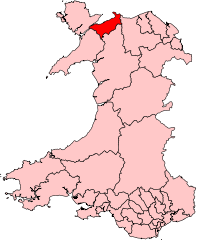- Conwy (UK Parliament constituency)
-
Not to be confused with Conwy (National Assembly for Wales constituency).
Coordinates: 53°11′28″N 3°41′17″W / 53.191°N 3.688°W
Conwy Former County constituency for the House of Commons 
Boundary of Conwy in Wales for the 2005 general election.Preserved county Clwyd, Gwynedd Major settlements Conwy, Bangor, Llandudno 1950–2010 Number of members One Replaced by Aberconwy Conwy was an electoral constituency represented in the House of Commons of the Parliament of the United Kingdom. It returned one Member of Parliament (MP) by the single-member district plurality (also known as first-past-the-post) system of voting.
The constituency was created for the 1950 general election, and abolished for the 2010 general election.
Contents
History
It was a marginal between the Conservative Party and the Labour Party throughout its existence.
The Conwy Welsh Assembly constituency was created with the same boundaries as the Conwy House of Commons constituency in 1999.
Boundaries
The constituency was, geographically, relatively small for its region, as it followed and tended to keep to the coast, taking in parts of two separate densely populated coastal conurbations.
As well as the walled castle town of Conwy from which it bore its name, the constituency mainly comprised the popular holiday resort and retail centre of Llandudno to the east, and the city of Bangor, which is home to the University of Wales, Bangor, to the west. It also included the smaller coastal towns of Penmaenmawr and Llanfairfechan, as well as some sparser inland areas including former slate-quarrying communities in the Ogwen Valley.
The constituency, notably, did not include Colwyn Bay (or outlying Rhos-on-Sea), which forms part of a coastal conurbation (and the Conwy county borough) with Llandudno and its outlying town of Penrhyn Bay—both in the constituency; this area comes under the constituency of Clwyd West to the east. Nor did it include the town of Caernarfon—just southwest of Bangor—which was in a constituency of the same name.
The constituency was also bordered by Meirionnydd Nant Conwy to the south, and the insular constituency of Ynys Mon to the west.
Following the decisions of the Welsh Boundary Commission, the Conwy seat was significantly altered, forming the base of a new Aberconwy constituency established for the 2010 general election. Part of the constituency (notably Bangor) became part of the new Arfon constituency.
Profile
Although the constituency included a student population from the university, most of the voters were towards the older end of the age spectrum as it was a popular retirement area. The constituency was also linguistically diverse, with mainly English speakers in the east and mainly Welsh speakers in the west and inland areas.[citation needed]
Members of Parliament
The last MP was Betty Williams of the Labour Party, who held the seat from 1997 (when she gained 35.04% of the vote—a 9.4% swing from the Conservatives) until its abolition in 2010. Williams increased her share of the vote in 2001 (by 6.8%), but it was reduced in 2005 (by 4.7%). She is also the first female MP to hold the seat. The seat was previously held (since its renaming in 1983) by Sir Wyn Roberts for the Conservative Party, who was first elected for Conway, the old anglicised name of the constituency, in 1970.
Election Member[1] Party 1950 William Elwyn Edwards Jones Labour 1951 Peter Thomas Conservative 1966 Ednyfed Hudson Davies Labour 1970 Wyn Roberts Conservative 1997 Betty Williams Labour 2010 Constituency abolished: see Aberconwy Elections
In the 2005 general election, the seat was the 81st easiest seat for the Liberal Democrats to gain, and the 153rd easiest seat for the Conservative Party to gain. The Labour Party did not include the seat on its list of vulnerable seats and eventually held the seat (with a reduced proportion of the vote).
Elections in the 2000s
General Election 2005: Conwy Party Candidate Votes % ±% Labour Betty Williams 12,479 37.1 -4.7 Conservative Guto Bebb 9,398 27.9 +4.2 Liberal Democrat Gareth Roberts 6,723 20.0 +3.1 Plaid Cymru Paul Rowlinson 3,730 11.1 -5.4 Green Jim Killock 512 1.5 +1.5 Socialist Labour David Lloyd Jones 324 1.0 +1.0 UKIP Ken Khambatta 298 0.9 -0.2 Legalise Cannabis Tim Evans 193 0.6 +0.6 Majority 3,081 9.2 Turnout 33,723 62.6 -0.3 Labour hold Swing -4.5 General Election 2001: Conwy Party Candidate Votes % ±% Labour Betty Williams 14,366 41.8 +6.8 Conservative David Logan 8,147 23.7 -0.6 Liberal Democrat Vicky MacDonald 5,800 16.9 -14.3 Plaid Cymru Ann Owen 5,665 16.5 +9.6 UKIP Allan Barham 388 1.1 N/A Majority 6,219 18.1 Turnout 34,366 62.9 -12.5 Labour hold Swing Elections in the 1990s
General Election 1992: Conwy[2] Party Candidate Votes % ±% Conservative Sir Wyn Roberts 14,250 33.7 −5.0 Liberal Democrat Rev. J. Roger Roberts 13,255 31.4 +0.1 Labour Betty Williams 10,883 25.8 +3.5 Plaid Cymru Rhodri V. Davies 3,108 7.4 −0.5 Independent Conservative Owen Wainwright 637 1.5 +1.5 Natural Law Ms David E. Hughes 114 0.3 +0.3 Majority 995 2.4 −5.1 Turnout 42,247 78.7 +1.0 Conservative hold Swing −2.5 See also
References
- ^ Leigh Rayment's Historical List of MPs – Constituencies beginning with "C" (part 5)
- ^ "Politics Resources". Election 1992. Politics Resources. 9 April 1992. http://www.politicsresources.net/area/uk/ge92/ge92index.htm. Retrieved 6 Dec 2010.
Constituencies in Wales (40) Labour (26) Aberavon · Alyn and Deeside · Blaenau Gwent · Bridgend · Caerphilly · Cardiff South and Penarth · Cardiff West · Clwyd South · Cynon Valley · Delyn · Gower · Islwyn · Llanelli · Merthyr Tydfil and Rhymney · Neath · Newport East · Newport West · Ogmore · Pontypridd · Rhondda · Swansea East · Swansea West · Torfaen · Vale of Clwyd · Wrexham · Ynys Môn
Conservative (8) Liberal Democrats (3) Plaid Cymru (3) Categories:- Historic parliamentary constituencies in North Wales
- Parliamentary constituencies in North Wales
- United Kingdom Parliamentary constituencies established in 1950
- United Kingdom Parliamentary constituencies disestablished in 2010
Wikimedia Foundation. 2010.
